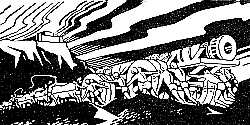 It wasn't until after his death that the cannon was first mentioned. There is an Arabic account of a cannon in 1303 and in Oxford, England, a picture dated 1326 shows what was called a "dart-throwing vase." Edward III used wooden cannon and a weapon consisting of one hundred and forty-four barrels in groups of twelve - an idea not unlike our rocket batteries of today. When Mohammed II besieged Constantinople in 1453, he had thirteen large guns called bombards and fifty-six small cannon. The bombards were immense - requiring sixty oxen to pull them into place. They threw stones thirty inches in diameter which weighed three quarters of a ton. But since it took two hours to load them, they could fire only a few times each day. However, the new weapon was effective and Mohammed's army battered its way into the city in less than two months and ended the Roman Empire in the East. |








